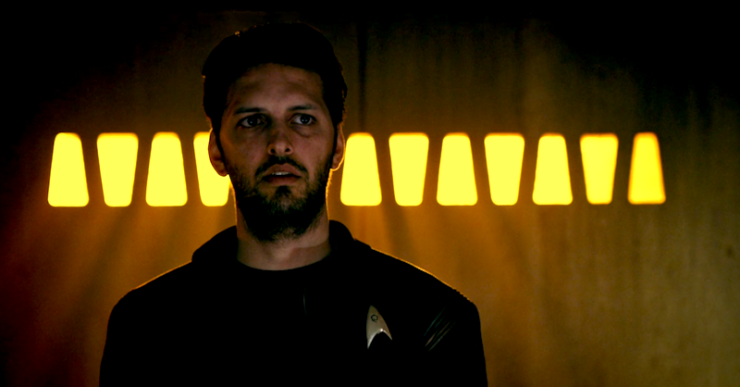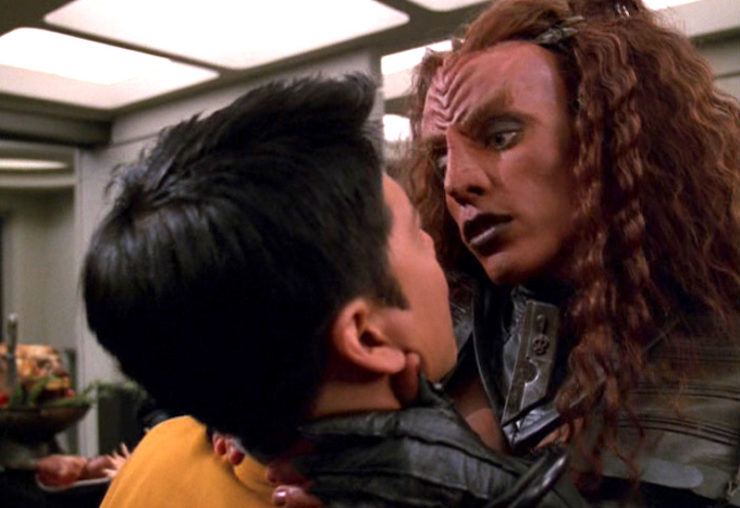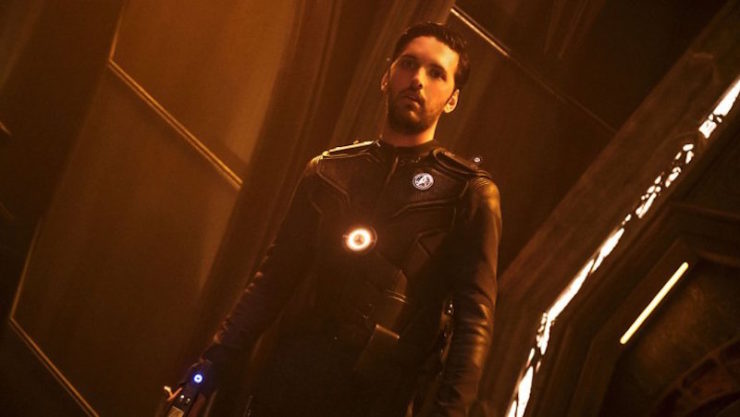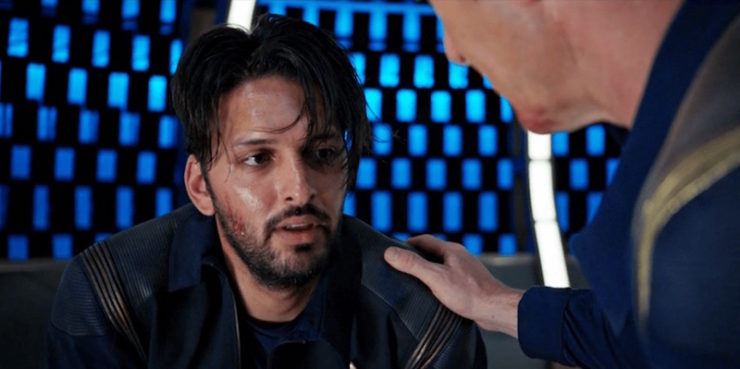[Content warning: discussions of rape and sexual assault]
The midseason finale of Star Trek: Discovery, “Into the Forest I Go,” was a fraught piece of television that touched on the emotional state of several core cast members. But no one’s journey was more painful than that of Lieutenant Ash Tyler.
There are a lot of theories surrounding the identity of Tyler, and the midseason finale seems to confirm those theories subtly without disengaging from his current struggles. When he and Burnham infiltrate the Klingon sarcophagus ship to plant sensors on board, he finally runs into L’Rell for the first time since escaping her capture. The encounter triggers PTSD flashbacks that render him compromised for the majority of the mission, and Admiral Cornwell works hard to talk him back into awareness. During his flashbacks, we see signs of surgery and the Klingon Voq—which plays into the theory that Tyler truly is Voq (he’s played by the same actor), now acting as a Klingon sleeper agent. But it’s clear that Ash is carrying memories of his human life that he believes, and that his capture at the hands of the Klingons was real in terms of his experiencing it. He remembers what happened to him, and has been deeply traumatized by it.
While he explained the terms of his capture as vaguely as possible to Captain Lorca, a later talk with Michael calls on Ash to give more detail of his capture. He reveals that the the only reason he survived over two hundred days as a Klingon prisoner was because he made himself available to L’Rell. Essentially, he permitted unwanted sexual acts and attention because he knew it would keep him alive.

The situation is disturbing for how realistic it is. Ash Tyler had to make a choice, to be continually raped and tortured by his captor, or to die. He chose the former, and horror of that does not leave him just because he managed to get away with his life. Whether or not Tyler turns out to be Voq makes no difference—as Ash Tyler, these events are a part of him, and they have devastated him. His trauma is persistent, detailed, and noted by the people around him.
And while Discovery might be offering the most depth to a conversation around male sexual assault that television has seen in a while, what might be more fascinating is that science fiction has long been a genre where discussing male rape was permissible. Sci-fi has a history of examining the concept of sexual assault from a male point of view, and the reasons for that commonality likely have much to do with depictions of power and how they function with science fiction story tropes.

It should be said that most genres do not take the concept of male rape seriously whatsoever, whether the rapist in question is male or female. Often these situations are the butt of jokes—if a man is the aggressor, it’s often a prison rape joke; if a woman is the aggressor, it’s usually suggested that the scenario can’t be rape because it’s impossible for a man to be uninterested in a woman’s sexual advances. This is constant background noise in the world of sitcoms; and even in other genres where it crops up, such as romance and fantasy, it is rare to see the idea tackled with the gravity it requires. What’s worse, sexual assault toward men in drama often seems to be added for shock value, added in to prove just how bad a situation or specific person is to heighten the stakes of a plot. We have to hope that Discovery will not make this mistake later on in the show’s run, but the signs are promising so far: Tyler’s trauma is not neatly resolved after being brought to the fore, which hopefully means that it is an emotional arc that the show will continue to explore.
Science fiction has done its fair share of winking and nudging too, to be fair—even in Star Trek. William Riker ends up having to sleep with an alien woman to escape her xenophobic planet in the episode “First Contact”… but he doesn’t seem too broken up about it. Jim Kirk is coerced pretty constantly during his tenure as Enterprise captain, yet no one ever frames these scenarios as sexual abuse, despite the fact that he is often only sleeping with the women in question in order to save the lives of his crew. Trip Tucker is impregnated without his knowledge by an alien race Starfleet has never before encountered in “Unexpected.” Odo asks Captain Sisko to prevent Lwaxana Troi from sexually harassing him, only to be told that he should consider her offer. In a situation similar to Discovery, Harry Kim is selected to be the mate of a Klingon woman who assaults him as part of their “mating rituals,” even though Kim wants no part of it. All of these situations are played lightheartedly, or as outright comedy.

And yet, with Discovery’s turnabout in how these narratives should be treated, it joins the ranks of other science fiction stories (particularly on television) that have made efforts to have this discussion. Those previous stories may not have reached the depth that Star Trek: Discovery has, but they provided a narrative space to consider this abuse rather than making fun of it or shoving it under a very large rug.
In Stargate: SG-1, Daniel Jackson is mind-controlled by the queen Hathor in order to force him to help her create Goa’uld larvae. Because of her power over men, an all-female task force is dispatched to rescue him, and the episode does not brush off the incident as anything less than violent assault—it is clear that there was a struggle in the room, and Daniel can barely speak. When Daniel encounters Hathor again later on in the show’s run, he cannot look at her. In fact, Daniel Jackson’s transformation as the show continues can be read as a desire to eradicate his vulnerabilities in response to abuse by the Goa’uld, of which Hathor’s rape is clearly a key encounter. Daniel Jackson has a great deal of difficulty trusting others, and it is hardly a surprise, given what has happened to him.
Farscape also has its central male character fall into the hands of an alien who rapes him. John Crichton is captured by Peacekeeper Commandant Grayza, who is attempting to extract information from him. She uses a pheromone that is excreted from a gland she had surgically implanted in her body; the effects of said pheromone are much like a roofie. John spends a great deal of time as her prisoner, but seems to bounce back relatively quickly when he is freed, and his feelings on her repeated violation are unclear. However, when he finally confronts Grayza at the end of the show’s fourth season, he makes it clear that her actions left their mark on him:
John: I have been in your hands. There’s no peace there. Just power.
Grayza: You are so self-righteous! I have used all my skills, all my resources for one perfect chance at peace! And because of you, it is gone and I am—
John: Frelled? Screwed? …Raped? Welcome to the Universe, Commandant.

While the show Quantum Leap often made light of toxic sexual situations, Sam Beckett frequently made it known that he was uncomfortable “leaping” into the bodies of other humans from the past, and then expected to interact with the people in their lives as they would. And while the narrative was often making jokes at Sam’s expense to that end, the show did make these deeply uncomfortable moments clear, noting that just because Sam was a man didn’t automatically mean he wanted to sleep with any woman who was willing, particularly when they didn’t know that he wasn’t the person they thought he was. (This dynamic was even more fraught when Sam lept into female people, but that is another conversation for another time.)
The series Misfits dealt with the concept of male consent via Alisha, whose superpower made people hyper-lustful when she touched them. Initially, she uses her power to get men to sleep with her, but when she tries it on Curtis—who knows about her power—he points out that what she’s doing is wrong. Alisha goes back to the men she touched and finds out that they barely even remember their encounters with her. That realization forces her to realize that what did was rape, and she begins to question whether or not it is possible for anyone to consent to sex with her because of the nature of her powers.
Even the most famous superhero in the world is a rape survivor—Batman’s son, Damian Wayne, is the product of Bruce Wayne’s rape at the hands of Talia al Ghul (in certain versions of the story, that is, as comics canon is a wooly thing). In various retellings of this story Talia even uses all the excuses that predators use when Bruce confronts her about drugging him into having sex with her; she tells him that he definitely liked it while it was happening, that it couldn’t have been so bad, that she knew he liked her so that made it okay. And while Bruce loves and accepts his son, he still has no problem making it clear to Talia that what happened between them was not consensual:

As with Ash Tyler on Discovery, all of these men are capable human beings who hold their own in a multitude of equally horrific situations elsewhere. In Batman’s case, you are dealing with a person who is often considered the peak of physical and mental discipline for a non-superpowered individual. This does not prevent them from being attacked or ensure their personal autonomy—it can happen regardless of personal ability or stature. In fact, it is important that Tyler is portrayed as a thoroughly capable and exceptional officer; Laura Hudson of The Verge makes the point that while some people think that they can brush off the stories of survivors by believing that rape only happens to people who make bad decisions, who aren’t careful, “Tyler’s story was designed around a more revealing, frightening truth: the only thing keeping any of us safe from harassment and abuse is our relative power in a situation. And that can be stripped away from any of us, regardless of gender, by a predator with the inclination and opportunity.”
All the same, there is something that unites most of these narratives that it’s impossible not to touch on: In the majority of the situations, the women in question have special abilities or items, be it extreme physical strength, or super abilities, or strange chemical compounds at their disposal. Perhaps this is the reason why it is easier for science fiction to tackle the concept of male sexual abuse—because if female attackers have interstellar science or untold strength to bring to bear, the idea of a man being sexually assaulted will strike viewers who are inclined to deny these stories as “more believable.” It’s an odd double edged sword to wield contextually because while science fiction uses allegory constantly to create meaningful narratives, you don’t want the audience to come away believing that male rape is only possible when the other party is a Klingon or possesses strange pheromones. It is essential that SF allows us to have these conversations, but not if it leads others to believe that assault is contingent on outrageous alien power.

But if the audience understands that fictional power is ultimately a stand-in for everyday power, then the fact that science fiction tackles this subject with such frequency is invaluable. There needs to be a place in the stories we tell to address the darkest corners of human experience, as both a point of education and a chance to reach out to others who have been wronged. The fact that the genre has already displayed an array of male characters who have experienced sexual abuse will let other survivors know that they are not alone. The fact that these characters are also skilled experts and heroes will make it clear that this manner of abuse can happen to anyone. The fact that these characters continue to live their lives shows everyone that those terrible moments do not define them in every moment of their day-to-day existence. Hopefully, Ash Tyler’s journey will contribute even more nuance to this conversation going forward.
If you or anyone you know requires support in the wake of sexual assault, the RAINN Sexual Assault Hotline is available as a resource.
Emmet Asher-Perrin is a Tor.com staff writer. You can bug her on Twitter and Tumblr, and read more of her work here and elsewhere.










